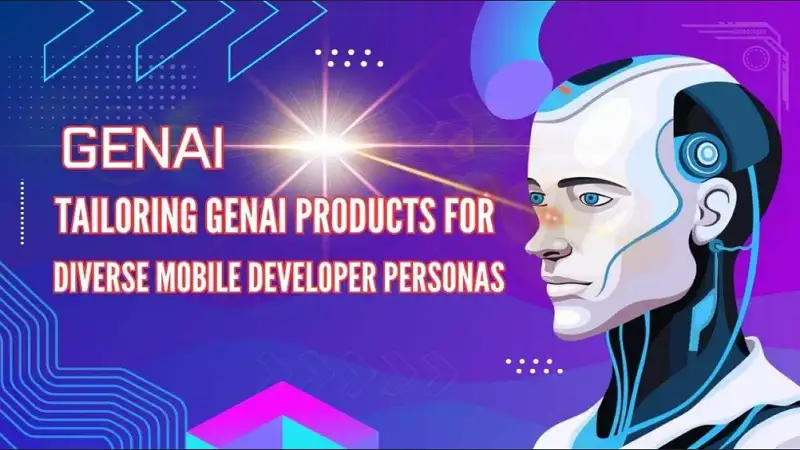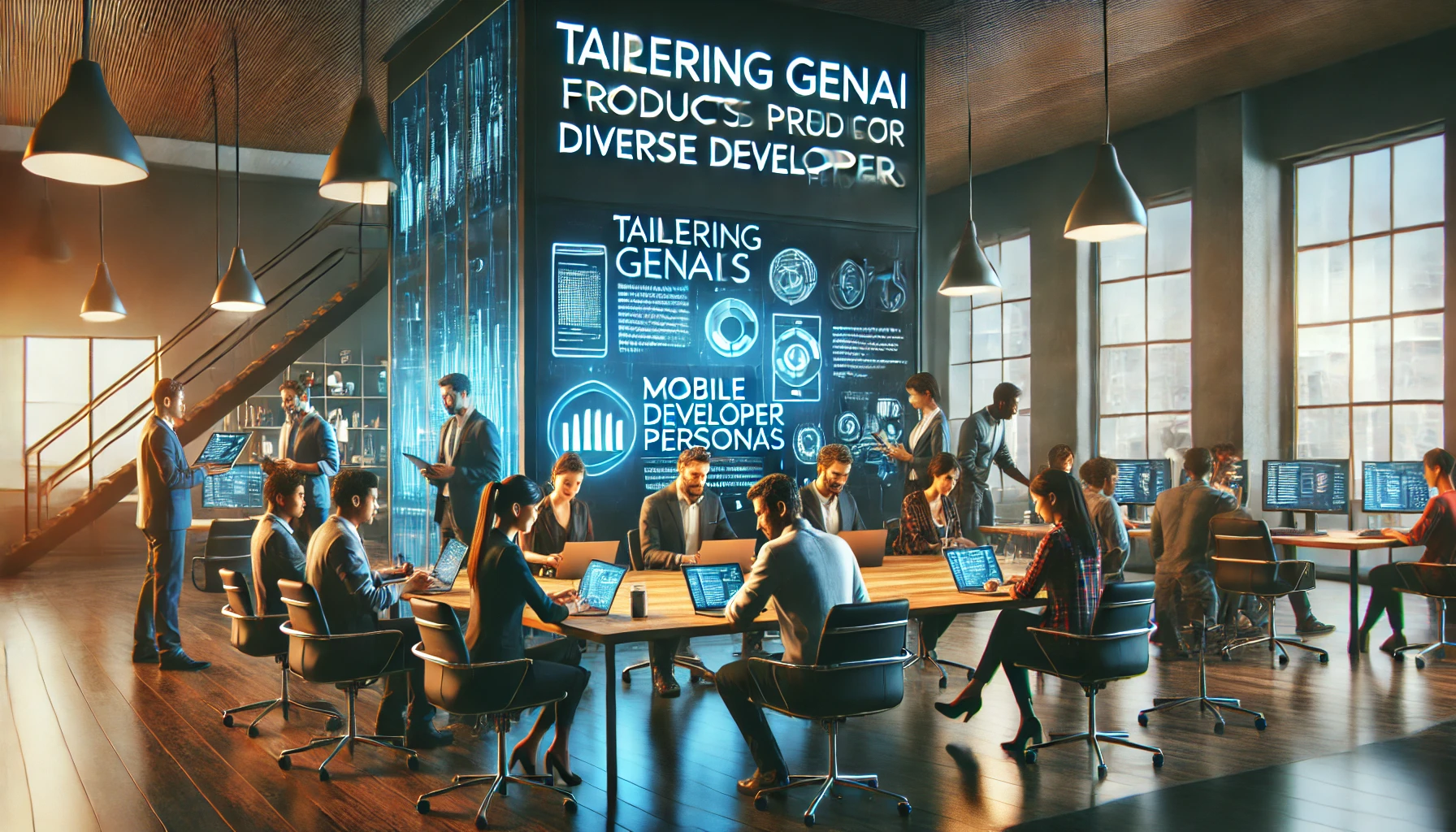The rapid rise of Generative AI (GenAI) products has transformed the tech landscape, particularly in mobile app development. As mobile developers continue to seek innovative ways to enhance their applications, the importance of tailoring GenAI products for diverse mobile developer personas becomes increasingly apparent. This guide will explore how mobile developer personas can inform the design and integration of GenAI products and APIs, ensuring that these tools meet the unique needs of developers at various experience levels. We’ll also discuss the shift towards on-device models and how this mirrors the evolution of backend and cloud services over the past decade.
Introduction: The Growing Importance of GenAI for Mobile Developers
The surge of GenAI tools and APIs is creating a new paradigm for mobile developers. These tools, which include AI-powered models capable of generating text, images, and code, have the potential to significantly enhance the functionality of mobile applications. However, to maximize their impact, it is crucial to understand how to tailor GenAI products for diverse mobile developer personas.
What is GenAI?
Generative AI, or GenAI, refers to a subset of artificial intelligence that focuses on generating new content or data rather than simply analyzing or classifying existing information. In the context of mobile app development, GenAI products can automate a variety of tasks, from content creation to app personalization. As mobile developers seek more advanced and intuitive tools, integrating GenAI into mobile applications promises to enhance user experience, improve app functionality, and streamline development processes.
The Transition Towards On-Device GenAI Models
As mobile devices become more powerful, the demand for on-device AI processing is growing. On-device models process data directly on the mobile device, as opposed to relying on cloud-based servers. This shift to on-device solutions addresses concerns around privacy, latency, and dependency on an internet connection. As we venture into this space, understanding the different developer personas will help shape the design of GenAI products that are both user-friendly and capable of meeting the unique needs of mobile developers.
Why Tailoring GenAI Products for Diverse Mobile Developer Personas Matters

Every developer has different goals, challenges, and levels of expertise. By tailoring GenAI products for diverse mobile developer personas, we can ensure that developers are equipped with the right tools to succeed. Mobile developer personas, inspired by User Experience (UX) personas, represent specific user types based on their behaviors, goals, and challenges when interacting with GenAI products.
Understanding the Concept of UX Personas
A UX persona is a fictional representation of a specific user type, created based on research into real users’ behaviors and needs. These personas serve as a guiding tool to design products that align with user expectations and preferences. In the case of mobile developers, UX personas provide insight into how different developers will engage with GenAI tools and what specific features they require for successful integration.
The Role of Personas in Tailoring GenAI Products
When creating GenAI products for mobile developers, it is essential to consider their diverse needs, experiences, and motivations. This means developing products that serve a wide range of mobile developers—from beginners looking for ease of use to experts seeking advanced customization and flexibility. By building GenAI products with these personas in mind, developers can ensure that their tools are effective, intuitive, and usable.
The Key Mobile Developer Personas to Consider
To tailor GenAI products for diverse mobile developer personas effectively, it’s essential to understand the unique characteristics of different mobile developer personas. Let’s take a closer look at four common personas that represent the diverse mobile developer landscape.
1. The Novice Mobile Developer
The novice mobile developer is often new to the field of mobile app development and may not have extensive experience working with AI or machine learning models. This persona is likely to need GenAI products that are easy to use, well-documented, and offer built-in solutions to reduce the learning curve.
Key Features for Novice Developers
- Pre-Built Models and Templates: Simplify the development process by providing ready-to-use models and templates that require little customization.
- Clear Documentation and Tutorials: Comprehensive, step-by-step guides and tutorials to help novice developers integrate GenAI products easily.
- Drag-and-Drop Interfaces: User-friendly, visual interfaces that enable novice developers to build applications with minimal coding.
2. The Experienced Mobile Developer

The experienced mobile developer has a strong foundation in app development and may have prior experience working with machine learning models. This persona is more likely to appreciate customizable APIs and the ability to fine-tune GenAI models for specific app requirements.
Key Features for Experienced Developers
- Customizable APIs: Provide greater flexibility for integration by offering APIs that developers can adjust to suit their specific needs.
- Advanced SDKs (Software Development Kits): Offer powerful SDKs that enable experienced developers to build and integrate complex GenAI features into their apps.
- Detailed Analytics and Debugging Tools: Tools that allow developers to analyze AI model performance and optimize it for mobile devices.
3. The Specialized Mobile Developer
Specialized developers work in niche areas such as gaming, augmented reality (AR), or virtual reality (VR), and have unique requirements for integrating GenAI products. For example, a gaming developer may need AI tools that can generate realistic game environments, while an AR developer may require AI models that enable real-time object recognition.
Key Features for Specialized Developers
- Real-Time AI Processing: For AR/VR applications, real-time processing and low-latency AI tools are essential for creating immersive experiences.
- Industry-Specific Models: Provide specialized models designed for niche industries, such as gaming, healthcare, or education.
- Performance Optimization: AI tools that are optimized for specific mobile devices to ensure smooth performance without lag.
4. The Business-Focused Mobile Developer
Business-focused developers prioritize efficiency, scalability, and security. They often work on large-scale applications or enterprise-level solutions where performance and reliability are paramount. These developers need GenAI products that integrate seamlessly into their existing workflows and handle large amounts of data without compromising security.
Key Features for Business-Focused Developers
- Scalability: GenAI products must be able to scale up to accommodate large datasets and numerous users.
- Enterprise-Level Security: Security features such as data encryption and secure APIs are crucial for business-focused developers working in regulated industries.
- Integration with Existing Systems: GenAI products must integrate smoothly with other business tools, such as customer relationship management (CRM) and enterprise resource planning (ERP) systems.
Tailoring GenAI Products to Meet the Needs of Each Persona
Once we’ve identified the key mobile developer personas, the next step is designing GenAI products that meet their unique needs. Let’s explore how we can tailor GenAI products for diverse mobile developer personas in more detail.
Designing for Novice Developers

For novice developers, the focus should be on simplicity and ease of use. GenAI products should be intuitive, with clear documentation and easy-to-navigate interfaces. Providing sample projects, pre-built models, and a guided setup process can help novice developers get started quickly without feeling overwhelmed.
Best Practices for Novice Developers
- Offer a Guided Onboarding Experience: A well-structured onboarding process that introduces novice developers to the product step-by-step.
- Create Low-Code or No-Code Options: Allow novice developers to integrate GenAI without extensive coding knowledge through low-code or no-code platforms.
- Focus on Plug-and-Play Functionality: Offer pre-configured GenAI models that developers can plug into their apps with minimal customization.
Designing for Experienced Developers
Experienced developers value flexibility and customization. They are likely to need advanced features that allow them to integrate AI models in more complex and unique ways. This requires offering powerful, customizable APIs, in-depth documentation, and tools that support deep integration.
Best Practices for Experienced Developers
- Provide Comprehensive API Documentation: Offer detailed API documentation that explains the parameters, endpoints, and customization options.
- Offer SDKs with Extensive Functionality: Create SDKs that provide developers with the tools they need to customize and optimize GenAI models for their specific use cases.
- Support Debugging and Analytics: Advanced tools for troubleshooting and performance tracking are essential for experienced developers working on complex projects.
Designing for Specialized Developers
Specialized developers need GenAI products that are optimized for their niche applications. These developers often require real-time processing, custom models, and tools that support specific industries such as gaming, healthcare, or AR/VR.
Best Practices for Specialized Developers
- Offer Industry-Specific AI Models: Provide models tailored to niche industries, such as game development or AR/VR, to meet specialized needs.
- Ensure Low Latency and Real-Time Processing: For AR and VR developers, low-latency models that process data in real time are essential.
- Provide Customization Tools: Allow developers to fine-tune GenAI models to match the specific needs of their applications.
Designing for Business-Focused Developers
Business-focused developers need GenAI products that are reliable, scalable, and secure. These developers often work in large organizations where performance is crucial, and the integration of GenAI must align with existing enterprise systems.
Best Practices for Business-Focused Developers
- Ensure Scalability: GenAI products must be able to scale to handle large volumes of data and numerous concurrent users.
- Focus on Security and Compliance: Provide enterprise-grade security features such as data encryption, secure access controls, and regulatory compliance.
- Facilitate System Integration: GenAI products should integrate seamlessly with existing enterprise applications and workflows, reducing friction for business developers.
Best Practices for Designing Tailored GenAI Products
In addition to understanding the specific needs of mobile developer personas, there are a few general best practices to follow when tailoring GenAI products for diverse mobile developer personas.
1. User-Centered Design
User-centered design is the backbone of persona-driven product development. By focusing on the specific needs, challenges, and goals of each developer persona, you can create products that are intuitive, effective, and user-friendly.
2. Continuous Feedback and Iteration
The development of GenAI products should be iterative, with constant feedback from developers to improve the tools over time. Regular updates and new features should be based on real-world usage and user feedback.
3. Educational Resources
To support developers, offer comprehensive educational resources such as tutorials, online courses, and user communities where developers can share knowledge and experiences.
4. Performance Optimization
Performance is key for mobile app development. Ensure that GenAI products are optimized for mobile devices, minimizing resource consumption and maximizing processing speed.
Conclusion: Building the Future of GenAI for Mobile Developers
As mobile development continues to evolve, GenAI products play an increasingly important role in shaping the future of mobile applications. By tailoring GenAI products for diverse mobile developer personas, we can ensure that developers are equipped with the tools they need to succeed. Whether for novice developers, experienced professionals, specialized creators, or business-focused developers, creating personalized and effective GenAI solutions is essential for maximizing the potential of AI in mobile development.
Also Read: Bryson DeChambeau Wife




